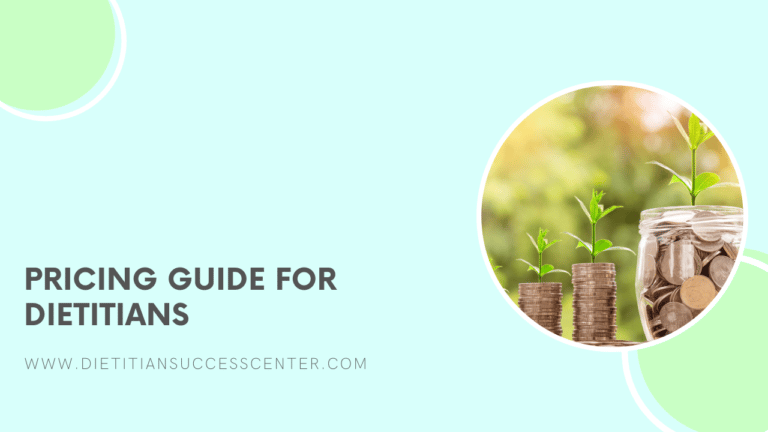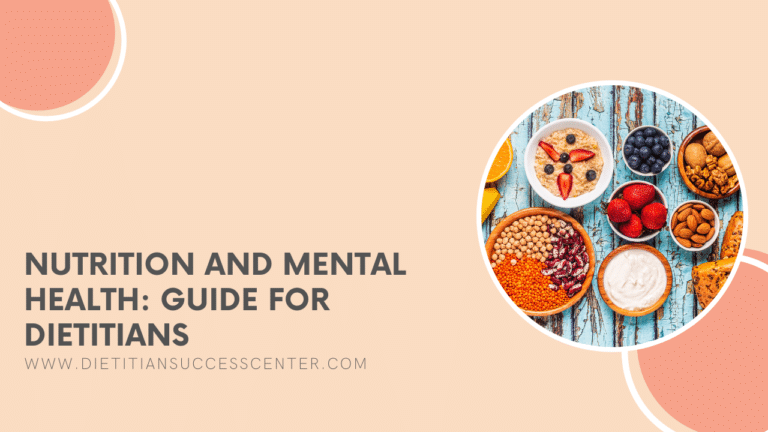

Written by Olivia Fournier, MAN(c), BASc (Dietetic Intern) (2024)
Reviewed by Krista Kolodziejzyk, RD, MPH, MBA
and Olivia Farrow, RD, MHSc
Do you have a dietitian business idea, but you have a tiny budget and don’t know where to start? In this article, we’ll cover the basics on how to find and apply for funding opportunities and grants, for dietitians wanting to start and grow their business.
Looking for funding opportunities can be intimidating. A quick Google search can yield hundreds of results that may not be exactly what you were hoping for. If you’re wondering what funding opportunities exist for your business, where to start looking for funding, and how to write a successful funding application, keep reading!
Note: Specific funding opportunities mentioned in this article are mainly targeted towards the USA and Canada. However, other countries will have similar programs. Tips for applying for funding are general. Be sure to carefully read the criteria to ensure you have the correct information in your funding application.
Why should I apply for grants for Dietitians?
Well… Why not apply!?
If an agency, corporation, or company is offering money for dietitian business ideas, you could be the one to receive it! There are tons of funding opportunities for any type of applicant, such as (1,2):
-
- Individuals
-
- Groups and research teams
-
- Community programs/organizations
-
- Start-up businesses
-
- Nonprofit and profit generating organizations
-
- Businesses or companies (of all types and sizes)
-
- Businesses owned/operated by certain populations (Indigenous, language minorities, rural residents, women, other racialized persons, 2SLGBTQIA+, youth (<40 yrs))
Check out the How to Start a Dietitian Private Practice blog post and Business Setup Video Course for an overview on starting your own business.
Where can I find funding opportunities?
(USA and Canada)
So, where do we actually find these funding opportunities?
Without guidance, searching the internet for grants and small business funding opportunities can be extremely frustrating. There are so many opportunities for all kinds of businesses, that it’s often difficult to sort through all the information that can be found from a quick Google search.
State/provincial or federal websites are a great place to start when looking for funding opportunities. These are usually data hubs that will offer tons of funding sources that are available. Periodically, large corporations will offer grants for nutrition-related topics or small business opportunities; such as pharmaceutical companies, for-profit corporations, grocery stores, and food service providers.
Here are a few examples of American and Canadian sites that offer various resources and tools for finding funding opportunities.
Disclaimer: DSC is not affiliated with, nor does DSC endorse any of the content on the following organizations, agencies, or websites. These sites are provided as publicly available resources that may be useful in finding funding opportunities for dietitian-run businesses.
United States
U.S. Small Business Administration (SBA)
This is a government website that offers a navigation tool, to find funding opportunities for small businesses. They can direct you to find loans, investment capital, disaster assistance, surety bonds, and grants. SBA also contains several resources and tips for how to start and grow your business, according to US regulations.
Through SBA, you can find more information at a local Small Business Development Center (SBDC) in your state. An SBDC can provide information and counseling on topics such as:
-
- Starting and growing your business
-
- Accessing capital
-
- Financial management
-
- Marketing
-
- Improving business planning and operations
-
- Implementing new technologies, where applicable
This federal government database is a useful search tool to narrow your scope when looking for funding opportunities. This site also offers resources to applicants to understand the essentials in applying for grants. Although this site is not nutrition specific, it does highlight a variety of grants applicable to health care and promoting businesses that support public health practices.
Academy of Nutrition and Dietetics
The Academy of Nutrition and Dietetic, similar to CFDR, does offer research grants, scholarships, and fellowships specific for RDs and dietetic students. Although this resource is not specific for starting or operating a small business, there may be research opportunities in your field that qualify for research funding through this agency.
United States Department of Agriculture (USDA)
Lastly, the USDA offers grants and funding for various community programs. Dietitians may be eligible for these grants if involved with a community based project. Listed on this site are opportunities for:
-
- Community based child nutrition programs, like school meal recipe development
-
- Rural enterprise business grants
-
- Community food projects
Canada
This federal government website offers an easy-to-use search function that allows you to find tons of federal and provincial grants and funding opportunities across Canada. There are a few filters to apply, that are specific to your type of business to help narrow your search to find exactly what is applicable for you. The search is also inclusive, and not limited to:
-
- Grants
-
- Tax credits
-
- Loans
-
- Advice
-
- Wage subsidies
-
- Interns, and more!
Canadian Digital Adoption Program (CDAP)
This federal website has a grant assessment tool, to confirm that your business is applicable for grant funding opportunities. There are grants available to grow your business online, if your business is a sole proprietor or incorporated business in Canada with 1 to 499 employees.
This site also provides resources for setting up e-commerce for your business, and improving profitability through your online investments. This tool is easy to access and navigate, and can be very useful for dietitian businesses.
Canadian Small Business Financing Program (CSBFP)
This federal government website offers term loans and lines of credit for small businesses in Canada. The program’s goal is to make it easier for small businesses to find loans from various financial institutions. Start-ups or businesses that are eligible for the CSBFP are:
-
- Businesses with a gross annual revenue of $10 million or less
-
- Partnerships
-
- Corporations
-
- Cooperatives
-
- Sole proprietors
-
- Non-profit or profit-generating businesses
Provincial Government Websites
These sites are also valuable for small businesses and start-up companies. Based on your location, there can be several opportunities for your business, and these sites can help you navigate these funding opportunities by province.
Canadian Foundation for Dietetic Research (CFDR)
The CFDR is primarily a research-based institution that offers research grants for RDs and dietetic students in Canada. This resource is not business-specific, however it is nutrition-specific. Meaning that you can apply for research grants related to your work in nutrition. In turn, this funding could support the growth of your practice and your business.
This agency supports 5 main objectives in the field of dietetic research:
-
- Critically (re)thinking dietetic practice
-
- Identify determinants of food choice
-
- Accelerate cultural safety, diversity, and health equity in practice
-
- Transform food environments
-
- Evaluate effectiveness of clinical interventions
See the 2024 CFDR Research Priorities to check if your project fits these objectives.
How do I know if I qualify for business funding?
All the information you’ll need to apply is going to be found on the website or application of the agency you are applying to. As a starting point, make sure and read the grant description over, and over, and over again! If you’re not sure if you qualify for funding, find a support email address or phone number to contact and confirm whether you qualify.
There are several grants, loans, tax credits, and other funding opportunities for all kinds of businesses (1). Depending on your location, the funder may have a specific definition of a ‘business’ that qualifies for their funding opportunity.
For example, a “small business” in Canada is a company with 1 to 99 paid employees (3). In the US, the Small Business Administration (SBA) determines the standard size for a business based on industry competition, average firm size, start-up costs, and several other factors to determine if the business is classified as a “small business” (4).
Knowing these criteria will put you one step closer to applying and accepting some business funding.
Plan ahead of time
Taking lots of time to plan your application ahead of time is important to keep yourself organized throughout this process (5). Here are some ways to plan ahead of writing your application:
-
- Get started early, by planning to write your application 6 to 12 months before the due date (7). This will give you plenty of time to review and implement all the criteria needed for your application.
-
- Define your objectives. Work together with your team or business partners to be clear on your objectives (5,7). Most funding opportunities will require applicants to state their business or research objectives early in the application (5,7). Being clear on what those are is an important step in successfully describing your funding needs.
8 Tips for Writing a Strong Application
Applying for funding can be an overwhelming task. Here are some tips that can help in planning, writing, and reviewing your funding application:
1. Do your research on the funding agency.
Make sure your project or business goals align with the objectives of the funding agency (7,8). A strong application will include an explanation of how the funding agency’s objectives align with those of your project or business (8). The agency’s vision, mission statement, main objectives, or goals are typically listed on their main website (8).
If your objectives do not align with those of the agency, find another funding agency that could better support your goals (7). Finding the appropriate agency will save you lots of time and money during the application process!
2. Read and follow the application instructions very carefully.
You don’t want to miss any requirements in the application. Take notes about the deadlines or special dates and any extra submission requirements (5,7). Some applications will require you to send in a picture of yourself, or to send the document as a pdf, for example. Applications that don’t follow these instructions are often the first to be eliminated by the reviewers (8,9).
3. Read the applications that were accepted in the past.
Reading applications that were successful in the past, can help you understand what they’re looking for in a successful application (5,8). Asking colleagues who have received funding from the same agency can be useful to know what they might be looking for in your application (5,6,9). Following the instructions and criteria outlined by the agency is key to having an attractive application.
4. Ask a colleague, or business partner, to review your application.
Before writing your application, ask a few colleagues, or business partners to review your application. Their perspective can help to ensure a clear application that flows logically to describe your objectives. These reviewers can help you to avoid jargon or uncommon language that may be confusing in your application (7,9).
Most funding agencies will have the review criteria uploaded on their website (7). Applying these criteria can help the reviewers to easily understand and navigate through your application (7).
5. Format your application so it’s easy to read.
Writing an easy-to-read application can also help the reviewers understand and navigate your application (7). Use appropriate headings that are either recommended by the agency, or that clearly introduce the section (5,8).
Be sure to write in declarative sentences that directly get your point across. Write in clear and concise sentences, so the reviewers can easily follow your application (5).
6. State why you’re the best candidate for the funding opportunity.
A strong application will include a section on why you, or your team, are the best candidate for this funding opportunity (7). Expressing why you’re the ideal candidate will give you a chance to highlight your expertise, and how you will take full advantage of the funding provided (7).
If you require additional training to be eligible for this funding opportunity, identify that you have the necessary skills or that your training is pending (6). Mentioning your unique skill set can put your application over the top, and advertise why you, or your team, is the right choice to receive the funding (6).
7. Describe your main goals in a hierarchy
Your overarching or long-term business goal should be mentioned first, to highlight the most important goal you aim to address with the funding provided (7). Afterwards, mention your smaller and more specific objectives to describe the significance of your long-term goal (7). The objectives section is often written in the following format (7):
-
- Long-term goal/overarching goal
-
- Rationale, or explanation of why this goal is important to address
-
- Specific aims or short-term objectives that will help accomplish the long-term goal.
Clarifying your goals is the key to making a strong first impression for the reviewers (8). The first thing a reviewer will read is the abstract, or introductory paragraphs describing your project goals (8). Ensuring a hierarchical list of goals can clearly describe what you intend to accomplish in the long-term, and how your short-term objectives will help achieve the main goal (7,8).
8. Sometimes less is more.
It can be tricky to know what information to include or remove from your application. You’re only required to cover the necessary criteria in the agency’s application description (10). Generally, keeping it concise with enough information to describe your funding needs, will strengthen your application (10).
Applying these tips can help strengthen your application for any funding opportunity. Planning ahead and allowing plenty of time to review the application can facilitate this process for you and your team.
Summary
In summary, there are tons of funding opportunities available for all types and sizes of dietitian businesses. Identifying your business and funding objectives and planning ahead of time, can make searching and applying for funding opportunities that much easier. Check out some of the above-mentioned websites, and search tools to find some funding opportunities that are applicable to you and your business goals!
Disclaimer: The information provided in all video content is for educational purposes only and is in no way professional, medical, or individualized business advice. Dietitian Success Center Inc. is not responsible and cannot be held liable for any actions or inactions taken related to the information provided. It is the user’s responsibility to validate content with their country’s current standards for dietetic practice before implementing.
References
1.Government of Canada. Business Benefits Finder. n.d. Available from: https://innovation.ised-isde.canada.ca/innovation/s/?language=en_CA
2.Granted Consulting. Grants for Small Business Guidebook: Who qualifies for small business grants in Canada? n.d. Available from: https://granted.ca/grants-for-small-business-guidebook/who-qualifies-for-small-business-grants-in-canada/
3. BDC. 10 things you (probably) didn’t know about Canadian small businesses. n.d. Available from:
4. National Archives. Code of Federal Regulations. 2007. Available from: https://www.ecfr.gov/current/title-13/chapter-I/part-121
5. Weidmann AE, Cadogan CA, Fialová D, Hazen A, Henman M, Lutters M, Okuyan B, Paudyal V, Wirth F. How to write a successful grant application: guidance provided by the European Society of Clinical Pharmacy. Int J Clin Pharm. 2023 Jun;45(3):781-786. doi: 10.1007/s11096-023-01543-7. Epub 2023 Mar 6. PMID: 36877291; PMCID: PMC10250258.
6. Koppelman GH, Holloway JW. Successful grant writing. Paediatr Respir Rev. 2012 Mar;13(1):63-6. doi: 10.1016/j.prrv.2011.02.001. Epub 2011 Mar 9. PMID: 22208796.
7. Gholipour A, Lee EY, Warfield SK. The anatomy and art of writing a successful grant application: a practical step-by-step approach. Pediatr Radiol. 2014. 44:1512–1517 doi: 10.1007/s00247-014-3051-8.
8. Kanji S. Turning Your Research Idea into a Proposal Worth Funding. Can J Hosp Pharm. 2015 Nov-Dec;68(6):458-64. doi: 10.4212/cjhp.v68i6.1502. PMID: 26715782; PMCID: PMC4690671.
9. Arthurs OJ. Think it through first: questions to consider in writing a successful grant application. Pediatr Radiol. 2014 Dec;44(12):1507-11. doi: 10.1007/s00247-014-3053-6. Epub 2014 Nov 19. PMID: 25408132; PMCID: PMC4236603.
10. Government of Canada. Government Funding: tips for writing strong a application. 2020. Available from: https://ised-isde.canada.ca/site/innovation-canada/en/first-things-first/government-funding-tips-strong-application








